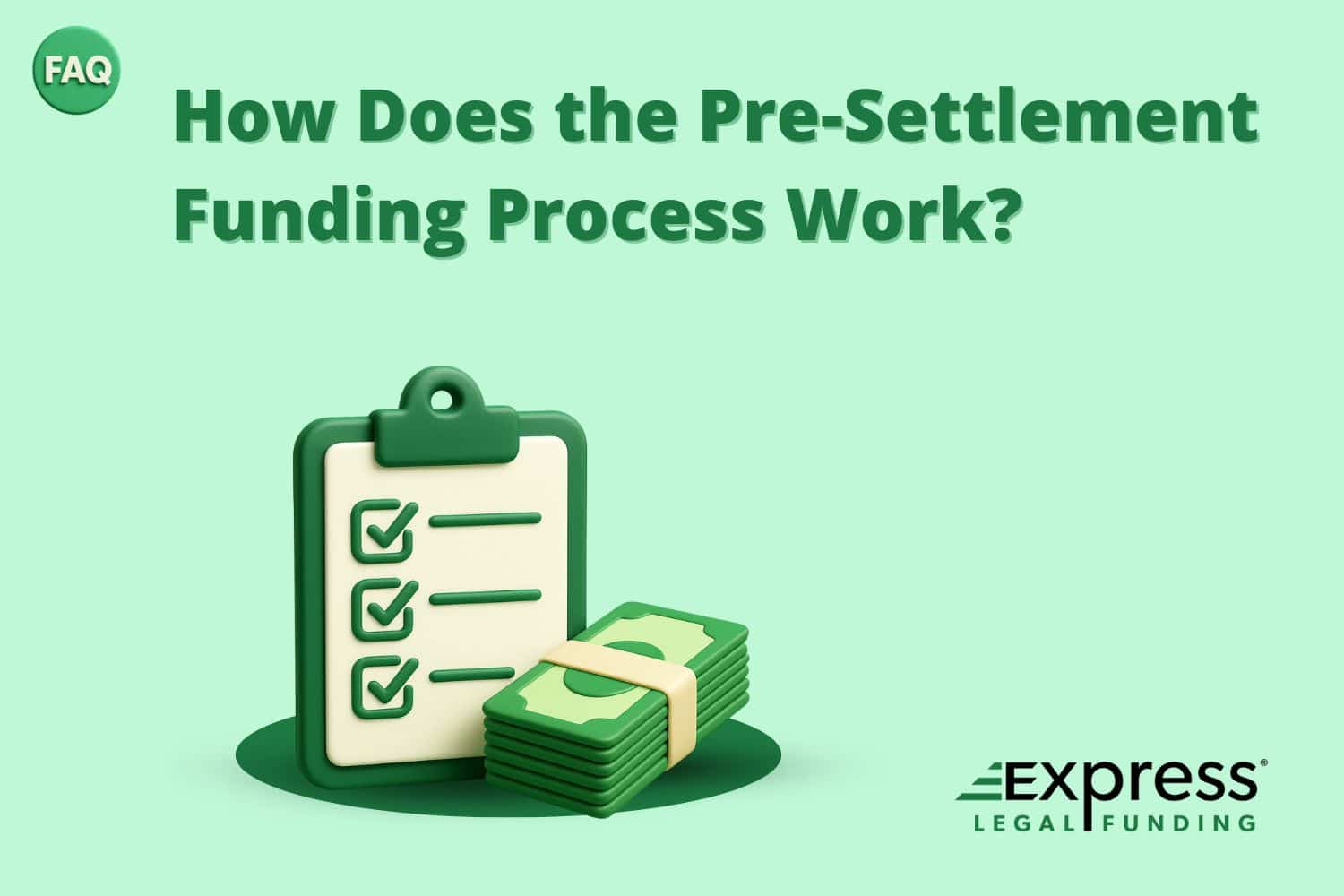
Why Underwriting Matters in Pre-Settlement Funding
Behind every personal injury claim is a story — a person trying to recover, rebuild, and regain financial stability after an accident.
As a Senior Underwriter at Express Legal Funding, I’ve evaluated thousands of these civil lawsuit cases. Each one is unique, yet all share a common thread: the need for fair and ethical evaluation before financial support can be approved.
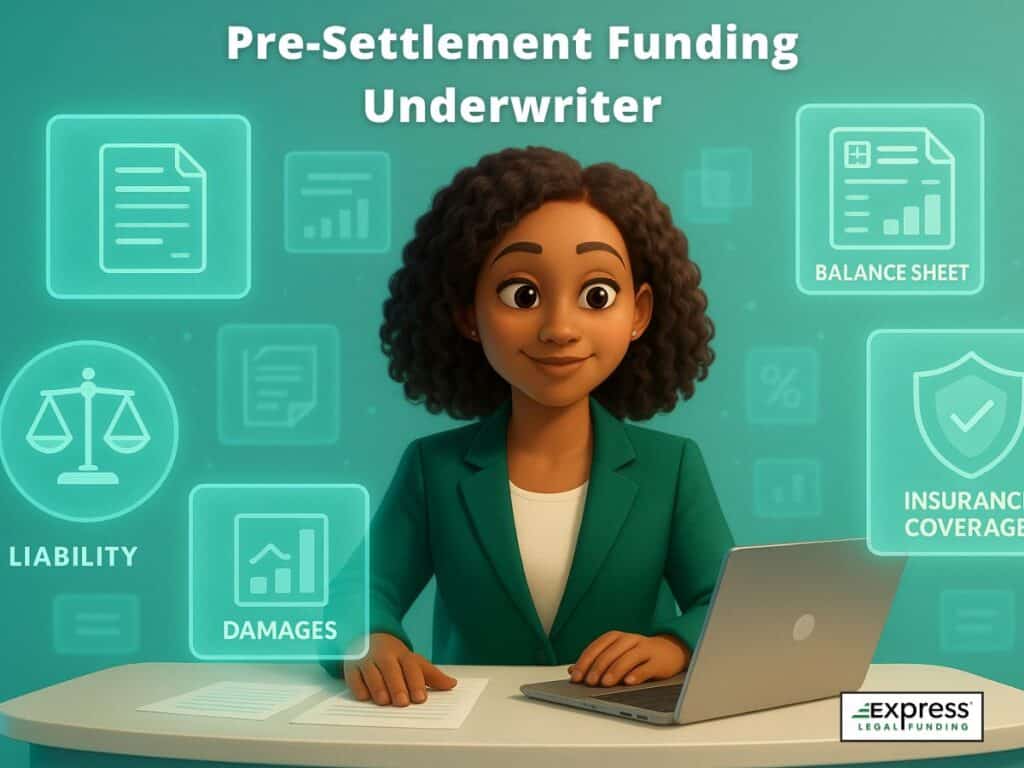
In legal funding, underwriting isn’t about credit scores or collateral. It’s about justice — ensuring that plaintiffs have access to risk-free financial relief while upholding the integrity of both the court system and the funding process.
In this guide, I draw upon my professional experience as a senior underwriter to explain what pre-settlement funding underwriting is and how the process works from start to finish.
What Underwriting Means in Pre-Settlement Funding
Underwriting is the process of evaluating a personal injury claim to determine whether it qualifies for non-recourse pre-settlement funding.
Unlike loans, this type of funding is repaid only if the plaintiff wins or settles their case. That means underwriters must carefully assess whether a case has a reasonable likelihood of success and a sufficient expected recovery amount to support the lawsuit cash advance.
How the Pre-Settlement Funding Underwriting Process Works — From Application to Approval
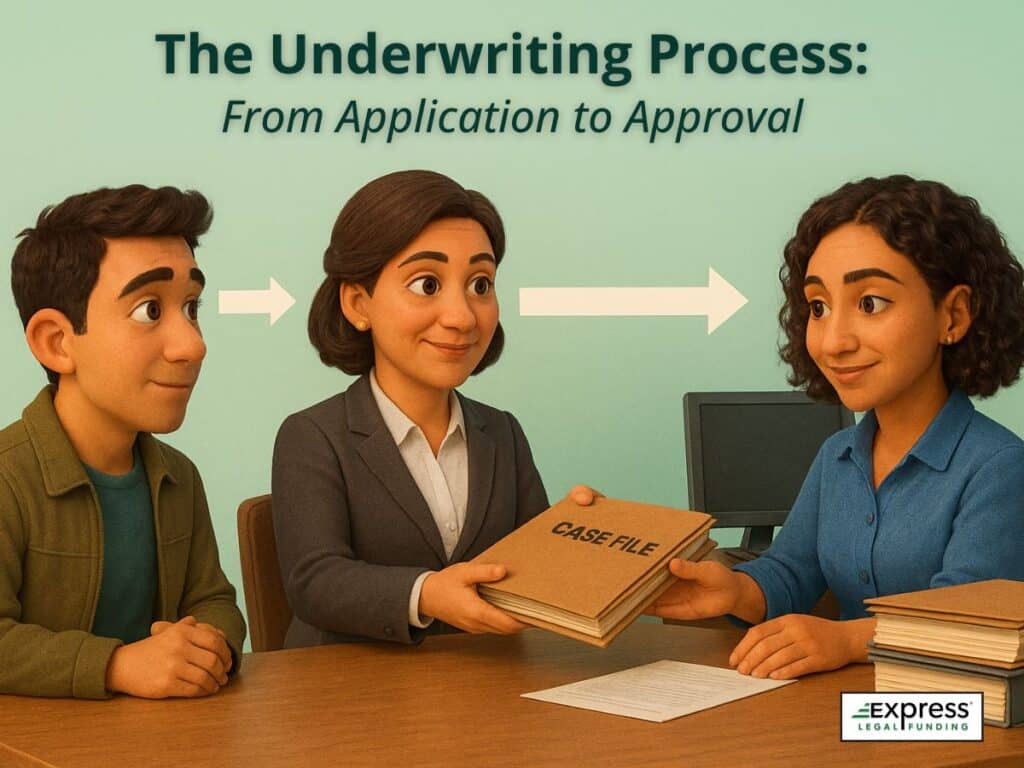
The underwriting process at Express Legal Funding follows a structured and transparent path:
- Application Received: The plaintiff applies online or by phone, and their attorney is contacted for case details.
- Case Review: The underwriter examines liability, damages, and coverage, supported by documentation such as police reports or medical summaries.
- Attorney Verification: The funding team confirms representation and attorney cooperation.
- Decision and Offer: A recommended advance is determined based on the current case status and available information at the time of review. Cases that qualify for funding may be funded up to10%–20% of the anticipated settlement value.
- Funding and Disbursement: Once approved, funds are often sent within 24–48 hours.
This streamlined approach ensures both speed and responsibility — balancing accessibility with sound risk management.
The Core Evaluation Factors of Legal Funding
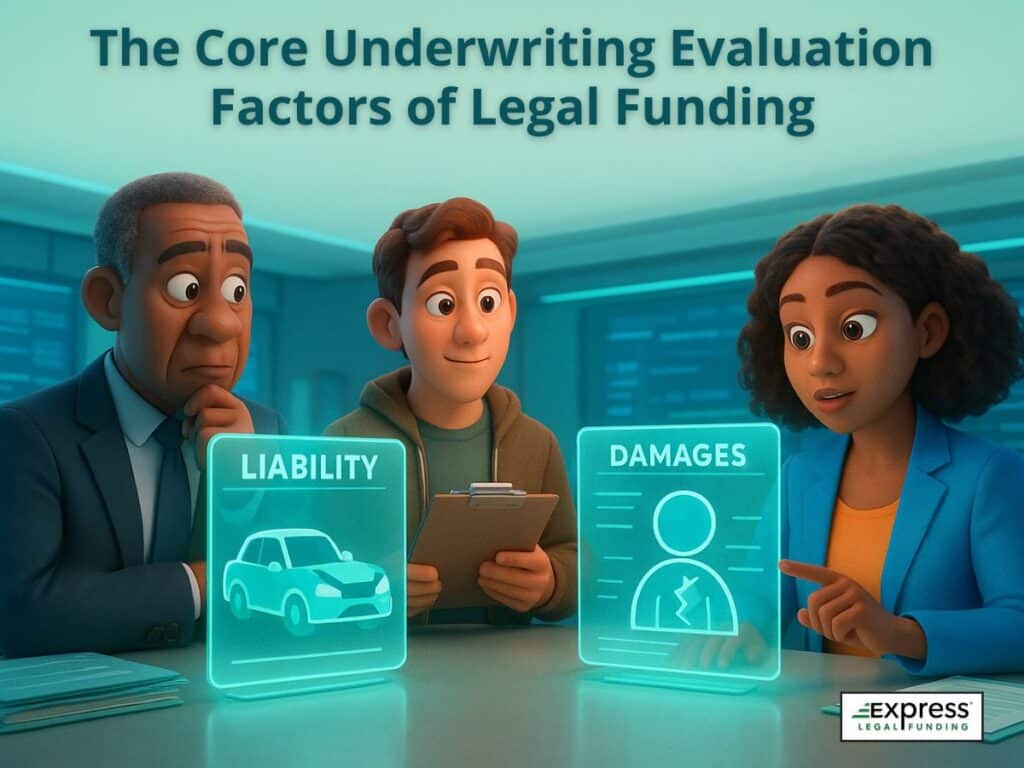
Underwriters review several key components before recommending approval:
- Liability: Who was at fault? Police reports, witness statements, and attorney evaluations help determine the strength of liability.
- Damages: Are the injuries well-documented and directly linked to the incident? Medical records, imaging, and treatment timelines are essential.
- Insurance Coverage: What policy limits are available? Adequate coverage is necessary to justify the requested funding amount.
- Attorney Strength: Experienced, responsive attorneys often achieve better case outcomes. A firm’s reputation and success rate matter.
- Previous Legal Funding: Cases with prior legal funding from other companies must be bought out by Express Legal Funding before advancing more funds. The amount owed to a previous funder determines how much more funding a case can support, if any.
- Jurisdiction: State laws and historical verdict data can influence case valuations and expected settlement timeframes.
Together, these factors provide a comprehensive picture of case viability.
The Role of the Attorney
A plaintiff’s attorney is a vital partner in the underwriting process. Underwriters rely on attorneys to provide documentation, updates, and professional insight into case strength.
Clear communication ensures a fast and transparent process — typically allowing Express Legal Funding to make funding decisions within 24 to 48 hours.
Collaboration between the attorney and the underwriter helps ensure that funding decisions are fair, accurate, and supportive of the plaintiff’s recovery.
Recognizing Red Flags
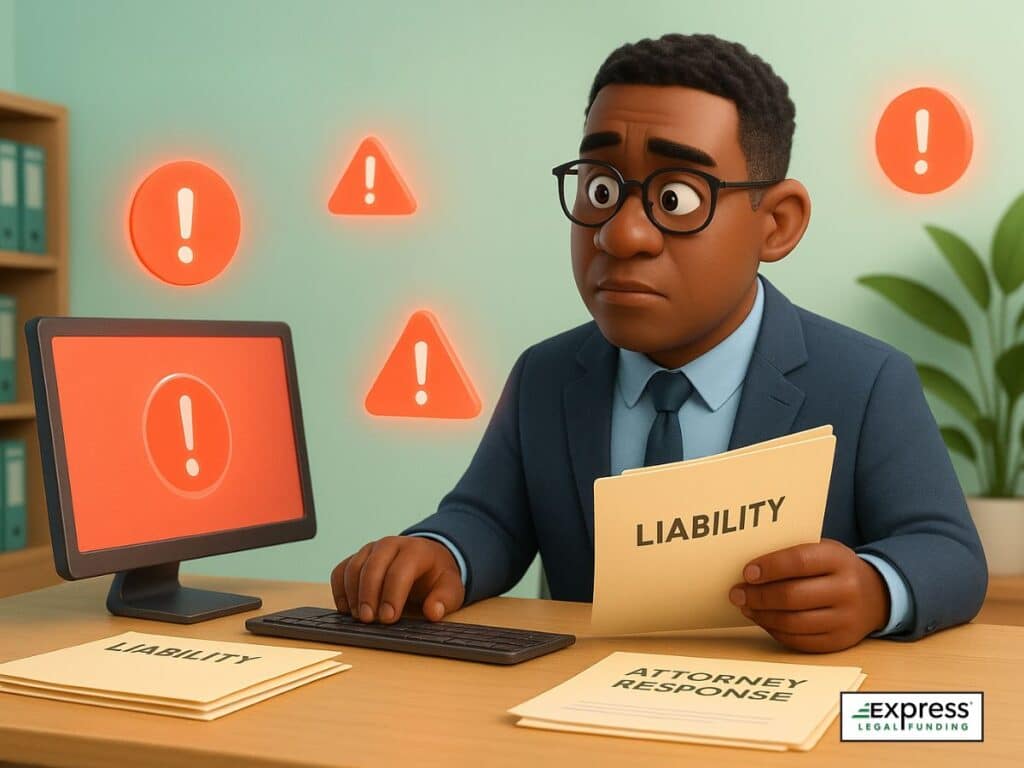
Responsible underwriting requires knowing when to proceed with caution — or when to decline a case. Common red flags include:
- Inconsistent or delayed medical treatment.
- Disputed liability with limited supporting evidence.
- Attorneys or firms that are unresponsive to communication.
- The attorney is not handling the case on a contingency fee basis.
- Existing liens or medical bills may exceed the case’s potential recovery.
Declining a case is not about denying help — it’s about protecting the client and the funding process from potential hardship or imbalance.
Balancing Risk and Compassion

Every underwriting decision impacts a real person’s life.
While data, reports, and calculations guide much of the work, empathy defines great underwriting.
A skilled underwriter sees beyond numbers — recognizing that each approval gives a plaintiff time, dignity, and breathing room to recover without financial pressure.
At Express Legal Funding, we believe underwriting isn’t about limiting access; it’s about providing safe, fair, and sustainable access to justice through ethical funding practices.
The Future of Underwriting Personal Injury Claims
Technology is reshaping how underwriters evaluate claims. Tools like AI-assisted analysis and predictive case modeling can help estimate settlement ranges and timelines with greater precision.
For instance, AI can help estimate average recovery times for specific injury types, helping underwriters make data-informed but human-led decisions.
However, no algorithm can replace human judgment — especially when compassion and ethics play a central role.
The most effective underwriters use technology as a supporting tool, not a substitute for discernment.
Conclusion: Fairness as the Foundation
Sound pre-settlement funding underwriting creates balance:
- Plaintiffs gain the financial relief they need.
- Attorneys maintain case integrity.
- Funding companies operate responsibly and transparently.
By combining careful evaluation with compassion, underwriters help transform pre-settlement funding from a transaction into a lifeline — one that supports fairness, access to justice, and hope for those waiting on their rightful compensation.
FAQs About Underwriting Pre-Settlement Funding
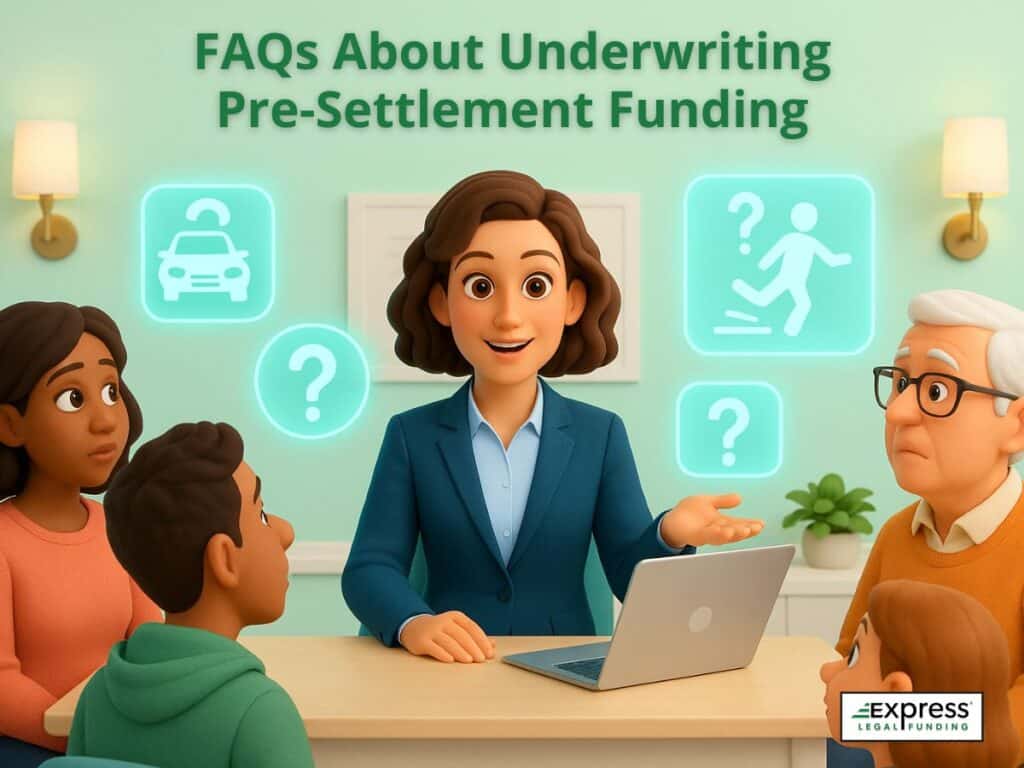
Underwriting is the key step that determines whether a case qualifies for pre-settlement funding. The legal funding FAQs below explain how the process works, what underwriters look for when reviewing a claim, and why ethical evaluation is essential to providing plaintiffs with fair, transparent, and risk-free financial support.
What is pre-settlement funding underwriting?
Pre-settlement funding underwriting is the evaluation process used to decide whether a personal injury or civil lawsuit qualifies for non-recourse legal funding. It involves reviewing case details such as liability, damages, and available insurance coverage to determine if the claim is strong enough to support a risk-free cash advance.
What does a legal funding underwriter do?
A legal funding underwriter reviews personal injury claims to determine if a plaintiff qualifies for non-recourse pre-settlement funding. They assess liability, damages, and case value — not credit or employment history.
What factors do pre-settlement funding underwriters look at when reviewing a case?
Pre-settlement funding underwriters focus on the strength of your personal injury claim, including liability, medical documentation, damages, and available insurance coverage. They also consider your attorney’s experience and cooperation, ensuring your case has a fair chance of success before funding is approved.
Do underwriters review prior funding from other companies?
Yes. If you already have pre-settlement funding from another company, underwriters will verify the amount you owe and review your existing contract. Express Legal Funding may buy out that advance before issuing new funding to ensure your case has only one active legal funding lien and a fair overall balance.
Does the underwriting process affect my attorney’s control of the case?
No. Legal funding underwriters cannot influence your attorney’s strategy or decision-making. Your lawyer remains in full control of negotiations and settlement timing. Underwriting is designed to support your case, not interfere with it.
How much pre-settlement funding can I get approved for through underwriting?
Approved pre-settlement funding amounts are typically between 10% and 20% of the anticipated settlement value. The exact amount depends on the case strength, damages, and available insurance limits as determined through underwriting.
Relevant read: How Much Pre-Settlement Funding Can I Get on My Case?
How long does the underwriting process take for legal funding?
Most approvals are completed within 24 hours once the attorney provides the necessary documentation required for underwriting.
Is every personal injury case approved through underwriting?
No. Responsible underwriters may decline cases with unclear liability, insufficient documentation, medical liens that exceed the potential recovery, or too much prior funding. This protects clients from overfunding and ensures advances remain fair and helpful.
What happens if my case is denied during underwriting?
If your case is denied during underwriting, it usually means the underwriter found unclear liability, limited insurance coverage, missing documentation, or that too much is already owed from existing funding. You won’t owe anything if your case is denied, since there’s never an application fee.
You may reapply later if your attorney provides new information or if your case circumstances change.
Relevant read: Why Pre-Settlement Loans Get Denied | Top 10 Reasons
Why is ethical underwriting important?
Ethical underwriting protects plaintiffs from financial overextension and maintains trust between clients, attorneys, and funding companies. It ensures the process is transparent, fair, and compliant with state regulations — helping plaintiffs access justice responsibly.
Relevant read: How to Choose a Trustworthy Legal Funding Company?
What makes Express Legal Funding’s underwriting different from other companies?
Express Legal Funding prioritizes fairness, speed, and transparency — offering ethical, non-recourse funding with no hidden fees or credit checks.
Underwriting FAQs for Specific Case Types
While the underwriting principles for pre-settlement funding remain consistent, the documentation and review process can vary depending on the type of case. The following FAQs explain how underwriting works for common personal injury claims — such as car accidents and slip and fall cases — and what specific documents underwriters typically need to evaluate each claim.
What documents are required for pre-settlement funding underwriting in car accident cases?
When evaluating car accident cases for settlement advances, underwriters typically need the police report, medical records, insurance policy information, and your attorney’s contact details. These documents help verify liability, confirm the extent of injuries and treatment, and assess the potential settlement value before approving legal funding.
What documents are needed for pre-settlement funding underwriting for slip and fall cases?
For slip and fall cases, underwriters review incident reports, photos or videos of the accident scene, medical records, and proof of property ownership or management. These materials help determine liability and confirm that the injuries resulted from unsafe conditions before funding is approved.
What documents are needed for pre-settlement funding underwriting for medical malpractice cases?
For medical malpractice cases, underwriters typically review the filed complaint or notice of intent, relevant medical records, expert reports, and proof of provider negligence. These documents help verify the standard of care, causation, and injury severity. Together, they allow underwriters to assess whether the case qualifies for non-recourse pre-settlement funding.
What documents are needed for pre-settlement funding underwriting for sex abuse lawsuits?
For sex abuse or sexual assault lawsuits, underwriters typically review the filed civil complaint, which outlines the allegations, defendants, and legal basis of the claim. Additional documentation may include police reports (if available), as well as medical or psychological treatment records. Reviewing the complaint helps confirm that the case is active, supported by legal representation, and suitable for non-recourse funding.
Relevant read: Maclaren Hall Lawsuit: Abuse Claims & $4 Billion Settlement

